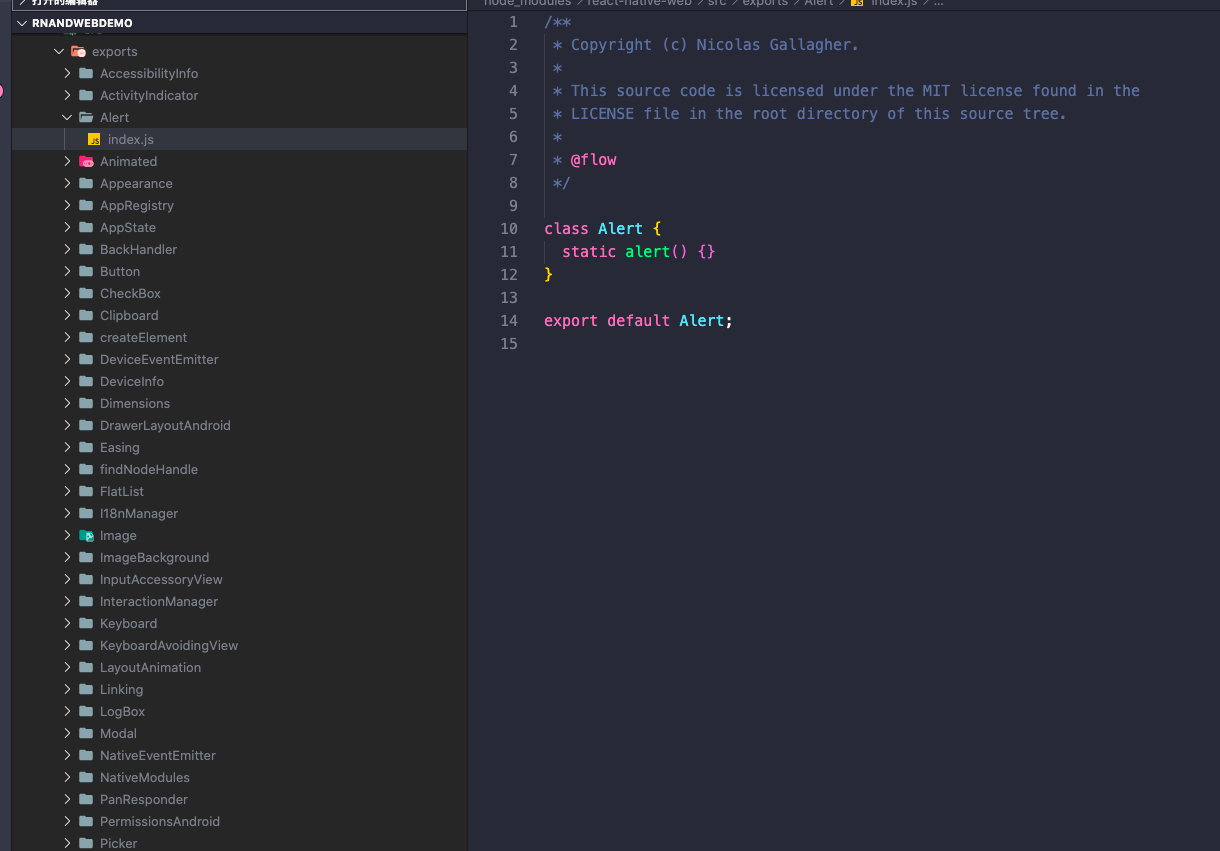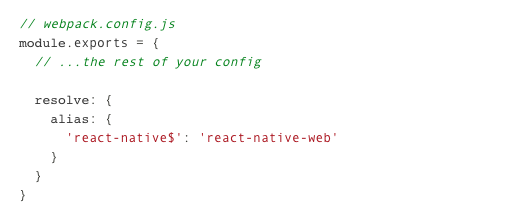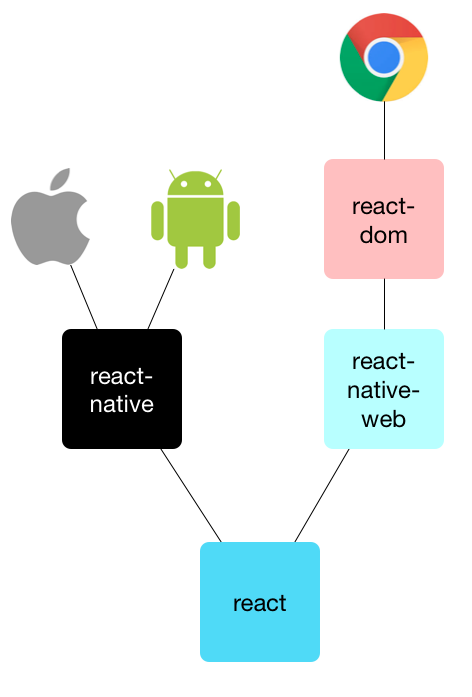认识 react-native-web
react-native-web 是由 Twitter 工程师(目前已加入 Facebook React.js 部门) Nicolas Gallagher 实现并维护的开源项目,目前已用在 Twitter、Flipkart、Uber 等项目中,它支持把 React Native 编写的项目转换成 Web 应用。
为 React Native 项目接入 react-native-web 成本极低:react-native-web 对原项目没有侵入性,无需改动原来的代码,只需在项目中加入一些 webpack 构建配置即可构建运行出和 React Native 应用一致效果的 Web 应用。
react-native-web 实现原理
react-native-web 实现了在不修改 React Native 代码的情况下渲染在浏览器里的功能,其实现原理如下:
在用 webpack 构建用于运行在浏览器里的代码时,会把 React Native 的导入路径替换为 react-native-web 的导入路径,在 react-native-web 内部则会以和 React Native 目录结构一致的方式实现了一致的 React Native 组件。在 react-native-web 组件的内部,则把 React Native 的 API 映射成了浏览器支持的 API。react-native-web 架构如图所示:
我们来看看 react-native-web 的源码:


它的方案其实挺简单粗暴,把 RN 的组件和 API 都用 H5 实现适配一遍,适配其行为和默认样式,在打包的时候使用 webpack 的别名机制将用到的组件替换成 react-native-web 里的对应组件。
#项目中正常使用 'react-native' 组件
import { component } from 'react-native'
# 使用 webpack 打包时会自动替换为
import { component } from ''react-native-web'
项目创建
- 创建 ReactNative 项目
项目以 RN 为主体,会涉及到原生自定义组件和通信,所以需要使用 React Natvie CLI 脚手架工具创建 ReactNative 项目
注意:本次采用了将现有 ReactNative 应用程序转换为 web 的方法。另一种等效方法是启动一个新的 React 项目 npx create-react-app 并转换为 ReactNative 应用.
- 添加 Web 支持
通过添加 react-native-web, 和 expo 编译配置即可让 RN 项目支持 web
安装相关依赖
// 全局安装 expo 工具
npm i -g expo-cli
// 项目增加 expo
yarn add expo
// 项目增加 react-native-web 和 web 运行环境 react-dom
yarn add react-native-web react-dom
配置 expo
// app.json
{
"name": "YourApp",
"displayName": "React Native Project",
+ "expo": {
+ "platforms": ["web"]
+ }
}
// index.js
import {
AppRegistry,
+ Platform
} from 'react-native';
import App from './App';
import {name as appName} from './app.json';
AppRegistry.registerComponent(appName, () => App);
+ if (Platform.OS === 'web') {
+ AppRegistry.runApplication(appName, {
+ rootTag: document.getElementById('root'),
+ });
+ }
通过 expo start 运行后, 输入 w 运行 web
expo
expo 工具内部实现了一套 web 运行配置, 包含 index.html, serve.json, favicon.ico , webpack 等配置.
项目根目录创建 web/ 文件夹可自定义实现 index.html, serve.json, favicon.ico
如需要自定义 webpack 配置:
- 安装 yarn add @expo/webpack-config
- 创建 webpack.config.js 文件到根目录
const createExpoWebpackConfigAsync = require('@expo/webpack-config');
// Expo CLI will await this method so you can optionally return a promise.
module.exports = async function(env, argv) {
const config = await createExpoWebpackConfigAsync(env, argv);
// If you want to add a new alias to the config.
config.resolve.alias['moduleA'] = 'moduleB';
// Maybe you want to turn off compression in dev mode.
if (config.mode === 'development') {
config.devServer.compress = false;
}
// Or prevent minimizing the bundle when you build.
if (config.mode === 'production') {
config.optimization.minimize = false;
}
// Finally return the new config for the CLI to use.
return config;
};
几个 webpack 配置:
// 本地调试解决跨域问题
config.devServer = {
...config.devServer,
port: 80,
proxy: {
'/api': {
target: 'http://xxx.com',
changeOrigin: true,
secure: false, //不校验
},
},
}
// 部署到子路径配置
if (config.mode === 'production') {
config.output.publicPath = '/subPath/'
}
通过 webpack 可自定义相关配置,并设置别名替换依赖包, 比如我们使用的 @ant-design/react-native 不支持 web, 可替换为 api 相同的 antd-mobile
config.resolve.alias['@ant-design/react-native'] = 'antd-mobile';
通过打印 createExpoWebpackConfigAsync 创建的配置,可查看 expo 的默认 webpack 配置:
{
mode: 'production',
entry: { app: [ '{your project path}/index.web.js' ] },
bail: true,
devtool: 'source-map',
context: '{your project path}/node_modules/@expo/webpack-config/webpack',
output: {
publicPath: '/',
path: '{your project path}/web-build',
globalObject: 'this',
filename: 'static/js/[name].[contenthash:8].js',
chunkFilename: 'static/js/[name].[contenthash:8].chunk.js',
devtoolModuleFilenameTemplate: [Function (anonymous)]
},
plugins: [
CleanWebpackPlugin {
dangerouslyAllowCleanPatternsOutsideProject: false,
dry: false,
verbose: false,
cleanStaleWebpackAssets: true,
protectWebpackAssets: true,
cleanAfterEveryBuildPatterns: [],
cleanOnceBeforeBuildPatterns: [Array],
currentAssets: [],
initialClean: false,
outputPath: '',
apply: [Function: bound apply],
handleInitial: [Function: bound handleInitial],
handleDone: [Function: bound handleDone],
removeFiles: [Function: bound removeFiles]
},
CopyPlugin { patterns: [Array], options: {} },
HtmlWebpackPlugin {
options: [Object],
childCompilerHash: undefined,
assetJson: undefined,
hash: undefined,
version: 4,
platform: 'web'
},
InterpolateHtmlPlugin {
htmlWebpackPlugin: [class HtmlWebpackPlugin extends HtmlWebpackPlugin],
replacements: [Object]
},
ExpoPwaManifestWebpackPlugin {
options: [Object],
writeObject: [AsyncFunction (anonymous)],
pwaOptions: [Object],
rel: 'manifest'
},
FaviconWebpackPlugin {
modifyOptions: {},
pwaOptions: [Object],
favicon: null
},
ApplePwaWebpackPlugin {
modifyOptions: {},
pwaOptions: [Object],
meta: [Object],
icon: null,
startupImage: null
},
ChromeIconsWebpackPlugin { options: [Object], icon: null },
ModuleNotFoundPlugin {
appPath: '{your app path}',
yarnLockFile: undefined,
useYarnCommand: [Function: bound useYarnCommand],
getRelativePath: [Function: bound getRelativePath],
prettierError: [Function: bound prettierError]
},
DefinePlugin { definitions: [Object] },
MiniCssExtractPlugin { options: [Object] },
ManifestPlugin { opts: [Object] },
WebpackBar {
profile: false,
handler: [Function (anonymous)],
modulesCount: 500,
showEntries: false,
showModules: true,
showActiveModules: true,
options: [Object],
reporters: [Array]
}
],
module: { strictExportPresence: false, rules: [ [Object], [Object] ] },
resolveLoader: { plugins: [ [Object] ] },
resolve: {
extensions: [
'.web.ts', '.web.tsx',
'.web.mjs', '.web.js',
'.web.jsx', '.ts',
'.tsx', '.mjs',
'.js', '.jsx',
'.json', '.wasm'
],
plugins: [ [Object] ],
symlinks: false,
alias: {
'react-native$': 'react-native-web',
'react-native/Libraries/Components/View/ViewStylePropTypes$': 'react-native-web/dist/exports/View/ViewStylePropTypes',
'react-native/Libraries/EventEmitter/RCTDeviceEventEmitter$': 'react-native-web/dist/vendor/react-native/NativeEventEmitter/RCTDeviceEventEmitter',
'react-native/Libraries/vendor/emitter/EventEmitter$': 'react-native-web/dist/vendor/react-native/emitter/EventEmitter',
'react-native/Libraries/vendor/emitter/EventSubscriptionVendor$': 'react-native-web/dist/vendor/react-native/emitter/EventSubscriptionVendor',
'react-native/Libraries/EventEmitter/NativeEventEmitter$': 'react-native-web/dist/vendor/react-native/NativeEventEmitter',
'react-native/Libraries/Image/AssetSourceResolver$': 'expo-asset/build/AssetSourceResolver',
'react-native/Libraries/Image/assetPathUtils$': 'expo-asset/build/Image/assetPathUtils',
'react-native/Libraries/Image/resolveAssetSource$': 'expo-asset/build/resolveAssetSource'
}
},
performance: { maxAssetSize: 600000, maxEntrypointSize: 600000 },
optimization: {
nodeEnv: false,
minimize: true,
minimizer: [ [TerserPlugin], [OptimizeCssAssetsWebpackPlugin] ],
splitChunks: { chunks: 'all', name: false },
runtimeChunk: true,
noEmitOnErrors: true
},
node: {
module: 'empty',
dgram: 'empty',
dns: 'mock',
fs: 'empty',
http2: 'empty',
net: 'empty',
tls: 'empty',
child_process: 'empty'
}
}
相关工具适配
- React Navigation - 路由组件
路由组件支持 web, 可直接添加运行
web 路由可通过配置 link 实现不同页面显示不同的 url
/// 设置深度链接, 设置过的屏幕可作为程序启动的根地址
// 如果返回一个空对象, 使用导航默认名称, 并且在地址栏输入任何子路径都会自动跳转到首页
const config = {}
// 如果设置了路径名称, 可在地址栏定位到此页面,未设置的页面会自动跳转到首页
const config = {
// 此方法设置后, 所有屏幕都会成为深度地址
// enabled: true,
// 如果启动的根地址不是当前设置的根地址, 导航栏可显示一个后退按钮回退到 initialRoute
initialRouteName: 'home',
screens: {
Home: 'home'
},
}
// 多层嵌套的页面
// 页面对象有一个 path 和 screens 属性
const config = {
screens: {
Tabs: {
path: 'Tabs', // 设置过 path,页面路径 host/Tabs/..
screens: {
UserStack: {
// path: 'user', // 没有设置 path, 当前这一层不在地址显示 host/Tabs/..
screens: {
UserCenterScreen: 'center', // 直接定义名称, 地址有显示 host/Tabs/center
},
},
},
},
},
}
const linking = {
prefixes: ['https://mychat.com', 'mychat://'], // 当前网站域名 和 app scheme, 针对 app 的 deeplink
config,
}
<NavigationContainer linking={linking}>
- Async-Storage - 数据持久化
已支持 web, web 端数据通过 Local Storage 存储
- React Native UI Kitten - UI 组件库
组件支持 web, 不过当前版本 expo webpack 运行会报错
web failed to compile
…
this.textInputRef.current?.focus();
…
解决方法:
- 安装 yarn add @expo/webpack-config
- 创建 webpack.config.js 文件到根目录,添加以下内容
const createExpoWebpackConfigAsync = require('@expo/webpack-config');
module.exports = async function(env, argv) {
const config = await createExpoWebpackConfigAsync({
...env,
babel: {
dangerouslyAddModulePathsToTranspile: ['@ui-kitten/components']
}
}, argv);
return config;
};
编写特定平台代码
为了让 ReactNative 三端同构能正常的运行,在有些情况下你不得不编写平台特定的代码,因为有些代码只能在特定平台下才能运行,编写特定的 web 平台代码有以下几种方式:
文件命名方式:
MyComponent.android.js
MyComponent.ios.js
MyComponent.web.js
如需要共享代码给 web 使用, 也可生成:
MyComponent.native.js
MyComponent.js
或
MyComponent.js
MyComponent.web.js
在使用的位置:
import MyComponent from ‘./MyComponent’
一个语音播报的例子:
// SpeechTool.web.js
// web 端语音播报
export const speechSpeak = (text) => {
var msg = new SpeechSynthesisUtterance(text)
msg.volume = 100
msg.rate = 1
msg.pitch = 1.5
window.speechSynthesis.speak(msg)
}
// SpeechTool.js
// 移动端语音播报, 通过原生 modules 实现, RN 调用
import {NativeModules} from 'react-native'
const SpeechToolModule = NativeModules.SpeechTool
export const speechSpeak = (text) => {
SpeechToolModule.speak(text)
}
// 调用位置
import {speechSpeak} from './SpeechTool'
speechSpeak('你好')
所有端的代码都在一个文件中,通过平台判断编写 web 专属代码:
import { Platform } from 'react-native';
if(Platform.OS==='web'){
// web 平台专属代码
}
不同平台区分样式:
import { Platform, StyleSheet } from 'react-native';
const styles = StyleSheet.create({
container: {
flex: 1,
...Platform.select({
ios: {
backgroundColor: 'red'
},
android: {
backgroundColor: 'green'
},
default: {
// other platforms, web for example
backgroundColor: 'blue'
}
})
}
});
其它
- react-native-web 暂不支持 RefreshControl 导致无法触发列表下拉事件问题
// 相关 Issues: https://github.com/necolas/react-native-web/issues/1027
// 修复 web 暂不支持 RefreshControl 导致无法触发下拉事件问题
// https://github.com/NiciusB/react-native-web-refresh-control
import { patchFlatListProps } from 'react-native-web-refresh-control'
patchFlatListProps()
- static-container 报错:
https://stackoverflow.com/questions/59949008/im-trying-to-run-expo-project
- [Text] fontSize not work when lower than 12 on web #1642 [safari 没此问题]
https://github.com/necolas/react-native-web/issues/1642
